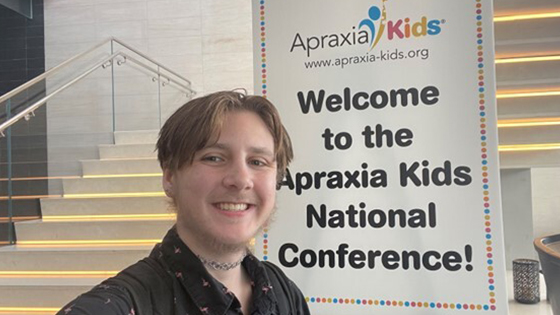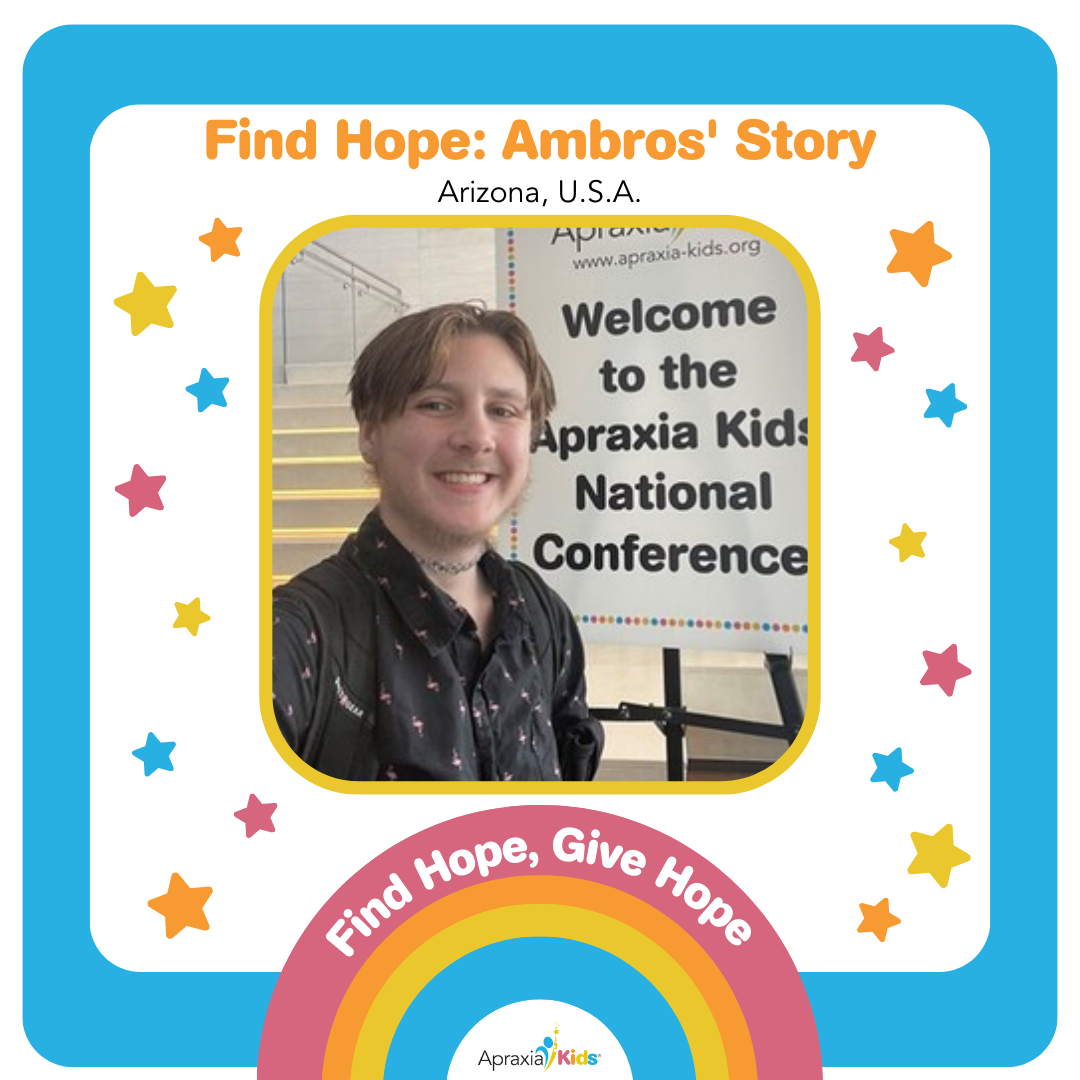
08 Aug Ambros’ Apraxia Journey

When I was 2 ½ years old, I started to receive early intervention services including speech through the state’s Division of Developmental Disabilities (DDD). At 2 years and 9 months, I entered my school district’s special education preschool. My parents then asked themselves whether I was getting enough communication access to learn what I needed to learn. They said: “There is a reason besides Ambros’ potential to get him where he needs to be. We need to set our expectations at what we KNOW he can achieve and develop the support necessary to get him there.” They then pushed the school district soon after to hire an outside evaluator who had an extensive background in working with children who have difficulties with oral motor planning.
This evaluation diagnosed me with severe childhood apraxia of speech. Now my parents were able to fight for me to get an hour of one-on-one speech services per week through the school, in addition to the hour of speech I received through early intervention services. This intensive speech therapy allowed me to become intelligible.
Since my Apraxia is now considered resolved, it is no longer something I deal with on a day-to-day basis. My apraxia tends to come out when I am tired, anxious, talking too fast, or pronouncing a new multisyllabic word for the first time. When my apraxia appears, I slow my speech down and use some of my speech strategies. If I am struggling to pronounce a word, I have supportive people who are willing to break the word down for me. Whenever I make mistakes in my speech or mispronounce a word, I let it roll off and laugh about it.
Currently, my biggest struggle with apraxia of speech is speaking Spanish. I understand the Spanish language more than I can speak it. When studying abroad in Spain, my professors did not understand my speech disorder. Because of this, they often told me my pronunciation was bad without giving me appropriate support to overcome this challenge. I still struggle with speaking Spanish coherently, however, I plan on seeing a Spanish speech-language pathologist in the future.
Some of my greatest accomplishments have been completing my bachelor’s degree from Northern Arizona University. I have a bachelor’s degree in communication sciences and disorders. I felt inspired to pursue the speech pathology field from my personal experiences in speech therapy. My speech therapists were kind and supportive people which allowed me to enjoy speech therapy a lot. I desire to help others who were just like me when I was younger.
My advice for families and professionals would be to educate themselves about apraxia and be proactive in getting their child all the services and support they need. My parents were extremely supportive of getting the state and school district to provide me with the services and support I needed to be successful.
My message of hope is that you can overcome your challenges with a lot of hard work.
Be inspired by more stories today and learn about how you can Give Hope!
Visit, FIND HOPE, GIVE HOPE

When I was 2 ½ years old, I started to receive early intervention services including speech through the state’s Division of Developmental Disabilities (DDD). At 2 years and 9 months, I entered my school district’s special education preschool. My parents then asked themselves whether I was getting enough communication access to learn what I needed to learn. They said: “There is a reason besides Ambros’ potential to get him where he needs to be. We need to set our expectations at what we KNOW he can achieve and develop the support necessary to get him there.” They then pushed the school district soon after to hire an outside evaluator who had an extensive background in working with children who have difficulties with oral motor planning.
This evaluation diagnosed me with severe childhood apraxia of speech. Now my parents were able to fight for me to get an hour of one-on-one speech services per week through the school, in addition to the hour of speech I received through early intervention services. This intensive speech therapy allowed me to become intelligible.
Since my Apraxia is now considered resolved, it is no longer something I deal with on a day-to-day basis. My apraxia tends to come out when I am tired, anxious, talking too fast, or pronouncing a new multisyllabic word for the first time. When my apraxia appears, I slow my speech down and use some of my speech strategies. If I am struggling to pronounce a word, I have supportive people who are willing to break the word down for me. Whenever I make mistakes in my speech or mispronounce a word, I let it roll off and laugh about it.
Currently, my biggest struggle with apraxia of speech is speaking Spanish. I understand the Spanish language more than I can speak it. When studying abroad in Spain, my professors did not understand my speech disorder. Because of this, they often told me my pronunciation was bad without giving me appropriate support to overcome this challenge. I still struggle with speaking Spanish coherently, however, I plan on seeing a Spanish speech-language pathologist in the future.
Some of my greatest accomplishments have been completing my bachelor’s degree from Northern Arizona University. I have a bachelor’s degree in communication sciences and disorders. I felt inspired to pursue the speech pathology field from my personal experiences in speech therapy. My speech therapists were kind and supportive people which allowed me to enjoy speech therapy a lot. I desire to help others who were just like me when I was younger.
My advice for families and professionals would be to educate themselves about apraxia and be proactive in getting their child all the services and support they need. My parents were extremely supportive of getting the state and school district to provide me with the services and support I needed to be successful.
My message of hope is that you can overcome your challenges with a lot of hard work.
Be inspired by more stories today and learn about how you can Give Hope!
Visit, FIND HOPE, GIVE HOPE
Credentials:
Hours of Operation:
Treatment locations:
Address:
,
Phone:
Email:
Overall Treatment Approach:
Percent of CAS cases:
Parent Involvement:
Community Involvement:
Professional consultation/collaboration:
Min Age Treated:
Max Age Treated:
Insurance Accepted:




